Blog • Published on:August 21, 2025 | Updated on:September 18, 2025 • 10 Min
A Complete Guide to Living and Investing in Grenada
Grenada is one of those places where daily life naturally blends with the rhythm of the Caribbean.
Known as the “Spice Isle” for its nutmeg, cocoa, and other exports, the island has drawn a growing number of people looking for both a home and an investment foothold in the region.
In the past decade, Grenada has become a strong relocation choice. The expat community keeps expanding, supported by favorable residency rules and the country’s well-regarded Citizenship by Investment (CBI) program.
Recent conversations about introducing physical residency requirements for future citizenship applicants make it even more important to understand how living here works in practice.
This guide explores Grenada from the ground up, where people choose to live, the real costs of housing and healthcare, how residency and citizenship are structured, and what opportunities exist for business and investment.
Why Choose Living in Grenada
Lifestyle and Community
Grenada offers a pace of life that feels unhurried yet connected. Locals are welcoming, and the expat community has grown steadily, making it easy for newcomers to find their place.
Weekly markets, sailing clubs, and neighborhood cafés create natural meeting points where residents mix with ease.
Natural Beauty
The island is rich in scenery, white sand beaches, clear waters, and lush rainforest. Unlike more crowded Caribbean destinations, Grenada has managed to keep a balance between development and preservation, which gives daily life a sense of openness and space.
Expat Growth
In the last decade, Grenada has seen a consistent rise in international residents, especially from North America and Europe.
This growth is tied to favorable residency options and the success of the Citizenship by Investment program, which has made it easier for families and entrepreneurs to establish roots on the island.
Investment Opportunities
Real estate remains attractive, with prices more accessible than in many U.S. or European markets.
Demand is increasing around St. George’s and Grand Anse, where new residential and tourism projects are reshaping the landscape. Investors see Grenada as a place where lifestyle and returns can work hand in hand.
Grenada Citizenship by Investment Program
Investment Options and Requirements
Grenada launched its Citizenship by Investment (CBI) program in 2013. Today, applicants can qualify through two main routes:
- Contribution to the National Transformation Fund (NTF): Minimum of $235,000 for a single applicant
- Approved Real Estate Investment: Either $350,000 for sole ownership or $270,000 per investor in a joint project, typically tourism-related developments
Both routes require additional government fees, due diligence checks, and processing costs.
Benefits of Grenadian Citizenship
Visa-Free Access
Grenadian citizens can travel to over 140 destinations without a visa, including the Schengen Zone, the United Kingdom, and China.
E-2 Visa Treaty with the U.S.
Grenada is the only Caribbean CBI country with an E-2 Investor Treaty with the United States, allowing citizens to apply for a U.S. investor visa.
Family Inclusion
Applications can include spouses, children up to age 30, parents, grandparents, and siblings, making it one of the most family-friendly programs in the region.
No Wealth or Capital Gains Taxes
Grenada uses a territorial tax system, meaning no taxes on global income, capital gains, or inheritance.
Application Process Overview
- Choose an Authorized Agent: Applications must go through licensed CBI firms.
- Prepare Documentation: Passport copies, proof of funds, clean criminal record, and medical certificate
- Submit Application & Investment: Payment into the chosen route (NTF or real estate)
- Due Diligence Check: Conducted by independent agencies and government bodies
- Approval & Passport Issuance: Typical processing time is 3–6 months
Recent Developments: Physical Residency
Grenada has been discussing whether future CBI applicants may be required to spend a period of physical residency on the island.
While not yet enforced, it signals a policy shift that could affect new investors. Those considering the program now should factor this into long-term planning.
Residency Requirements in Grenada
Visa Types for Expats
- Visa-Free Entry: Citizens of the U.S., UK, EU, and Commonwealth can stay for up to 90 days without a visa
- Extension Visa: Stays beyond 90 days require an extension from the Immigration Department
- Work Permit: Required for foreign nationals employed in Grenada, issued by the Department of Labour
- Digital Nomad Visa: Allows remote workers earning at least $37,000 per year to live and work in Grenada for up to 12 months
Permanent Residency Options
- Permanent Residency: Available to foreigners who have legally lived in Grenada for at least 2 years
- Citizenship by Naturalization: After 7 years of residency, foreigners can apply for citizenship through naturalization
- Citizenship by Investment: Provides an immediate route to permanent settlement for qualified investors
Documentation Needed
Typical requirements for residency applications include:
- Valid passport
- Proof of funds or income
- Health screening certificate
- Police clearance certificate
- Housing lease or proof of accommodation
Cost of Living in Grenada
Housing and Real Estate Costs
- Rent (1-bedroom in city center): about $615/month
- Rent (1-bedroom outside center): about $395/month
- Rent (3-bedroom in city center): about $1,250/month
Foreign buyers need an Alien Landholding Licence (10% of property value), unless purchasing through the CBI program
Daily Expenses
- Groceries: Local food is affordable (fruit, vegetables, fish, chicken). Imported goods like dairy or electronics cost more
- Dining Out: A casual meal costs $7–10, while a three-course dinner for two is about $75–80
- Utilities & Internet: Around $270/month for electricity, water, and Internet
Healthcare Expenses
- Public healthcare is inexpensive but basic
- Many expats take private insurance with medical evacuation coverage
Education Costs
- Public schools are free
- International/private schools range from $2,500–$10,000 per year
- St. George’s University tuition is higher, especially for medicine and veterinary programs
Best Places to Live in Grenada
St. George’s
The capital combines colorful hillside views with a working port and historic forts. It’s the busiest area on the island, with government offices, markets, and easy access to schools and healthcare.
Apartments in the city center are more expensive than elsewhere but still affordable compared to U.S. or European cities.
Grand Anse
Grand Anse is Grenada’s most famous beach area. It has a mix of luxury hotels, condos, and rental apartments, plus shops and restaurants within walking distance.
It’s popular with expats who want a balance of beach lifestyle and modern convenience.
Lance aux Epines
This is Grenada’s upscale residential area, home to villas, gated communities, and marinas.
It attracts yacht owners, entrepreneurs, and families looking for privacy and security. Prices here are higher, but so is the standard of living.
True Blue
True Blue is built around St. George’s University, which draws students and faculty from around the world. It has a younger, more international atmosphere, with plenty of cafes, bars, and rental options catering to students and visiting professionals.
Healthcare System in Grenada
Public Healthcare Facilities
Grenada has several public hospitals and health centers. The General Hospital in St. George’s is the main facility, with smaller clinics spread across the island. Care is affordable, but services and equipment can be limited compared to larger countries.
Private Medical Options
Private clinics and hospitals offer faster service and better facilities. Many expats choose private care for everyday needs, while keeping insurance that covers treatment abroad for serious or specialized cases.
Health Insurance Requirements
Health insurance is not legally required, but most expats take it. Policies that include medical evacuation coverage are strongly recommended, since advanced treatments often mean flying to the U.S., Barbados, or Trinidad.
Business and Investment Opportunities
Tax Benefits and Incentives
Grenada follows a territorial tax system, meaning foreign income is not taxed. There are also no capital gains, inheritance, or wealth taxes.
Investors can access incentives such as tax holidays and duty-free concessions through government-approved projects.
Economic Sectors
Key growth areas include:
- Tourism and Hospitality: Hotels, resorts, and eco-tourism projects
- Real Estate Development: Driven by expat demand and the CBI program
- Agriculture and Spices: Nutmeg, cocoa, and other exports maintain steady demand
- Education: St. George’s University is a major employer and economic driver
Starting a Business
Foreigners can start businesses in Grenada with relative ease. The process requires:
- Business registration with the Corporate Affairs and Intellectual Property Office
- Relevant licenses or permits, depending on the sector
- A local address and proof of capital or investment
Grenada’s membership in CARICOM also allows access to regional trade opportunities.
Education System in Grenada
International Schools
Grenada has a few private and international schools that follow U.S. or British curricula.
These are the preferred choice for most expat families, with annual tuition ranging from $2,500 to $10,000, depending on the grade level and institution.
St. George’s University
St. George’s University (SGU) is internationally recognized, especially for medicine and veterinary programs.
It attracts students and faculty from around the world, adding a strong academic and international presence to the island.
Local Education Options
Public education is free and based on the British system. Attendance is compulsory for children ages 5 to 16.
While local schools are affordable, many expats opt for private or international institutions for consistency with global standards.
Climate and Lifestyle in Grenada
Weather Patterns
Grenada has a tropical climate with warm temperatures year-round, averaging 77–88°F (25–31°C). The dry season runs from January to May, while the rainy season is June to December, with occasional hurricanes during late summer and early fall.
Caribbean Culture
Life in Grenada revolves around community, food, and music. From weekly markets in St. George’s to island-wide celebrations like Carnival, the culture blends African, French, and British influences. The atmosphere is welcoming, and expats often find it easy to integrate.
Recreational Activities
Outdoor life is a big part of living in Grenada. Popular activities include:
- Sailing and yachting from one of the island’s marinas
- Diving at world-class reefs and shipwrecks
- Hiking in the Grand Etang rainforest
- Relaxing on beaches like Grand Anse and Magazine Beach
Legal Considerations for Expats
Property Ownership
Foreigners can buy property in Grenada, but they generally need an Alien Landholding Licence (ALHL), which costs 10% of the property value.
An exception applies if you purchase real estate through the Citizenship by Investment program. In that case, the ALHL is waived.
Banking Requirements
To open a bank account in Grenada, expats usually need:
- Valid passport
- Proof of address (local lease or utility bill)
- Proof of income or source of funds
- Initial deposit (varies by bank)
Both local and international banks operate on the island, and accounts can be held in Eastern Caribbean dollars or U.S. dollars.
Tax Obligations
Grenada applies a territorial tax system:
- Foreign income is not taxed.
- Local income is taxed progressively, up to 28%.
- No taxes on capital gains, inheritance, or wealth.
Expats earning abroad generally have no tax liability in Grenada, but U.S. citizens must continue filing with the IRS due to citizenship-based taxation.
Practical Tips for Moving to Grenada
Relocation Timeline
Plan at least 3–6 months ahead. This gives enough time to handle visa paperwork, banking, housing, and, if applicable, investment or residency applications.
Housing Search
Popular expat areas include St. George’s, Grand Anse, Lance aux Epines, and True Blue. Rentals are widely listed online, but many good deals are found through local agents once you’re on the island.
Transportation Options
Most people rely on cars since public transport is limited. Buses and minibuses cover main routes but aren’t always reliable. Importing a car is possible but costly due to duties, so many expats buy locally.
Cultural Integration
Grenada is community-oriented. Joining sailing clubs, markets, or neighborhood events is the fastest way to connect. Locals are generally welcoming, and English being the official language makes integration straightforward.
FAQs About Living in Grenada
1. How long can foreigners stay in Grenada without a visa?
Citizens of the U.S., UK, EU, and many Commonwealth countries can stay in Grenada for up to 90 days visa-free. To stay longer, you need to apply for an extension or a residency permit.
2. Can foreigners buy property in Grenada?
Yes, but foreign buyers need an Alien Landholding License (10% of the property value). If you purchase property through the Citizenship by Investment program, this license is waived.
3. How much does it cost to live in Grenada per month?
A single person typically spends between $1,500 and $2,000 per month, including rent, utilities, and daily expenses. Families or those in luxury areas will need more.
4. Is healthcare in Grenada good enough for expats?
Public healthcare is affordable but basic. Most expats use private clinics for routine care and keep health insurance with medical evacuation for emergencies or specialized treatment abroad.
5. What are the benefits of Grenadian citizenship?
Grenadian citizenship offers visa-free travel to 140+ countries, access to the U.S. E-2 investor visa, the ability to include family members in one application, and a favorable tax system with no tax on foreign income, capital gains, or inheritance.
References
Numbeo. (2025). Cost of Living Comparison Between United States And Grenada. Retrieved from https://www.numbeo.com/cost‑of‑living/compare_countries_result.jsp?country1=United+States&country2=Grenada
Wikipedia. (2025). Grenadian nationality law. Retrieved from https://en.wikipedia.org/wiki/Grenadian_nationality_law
Numbeo. (2025). Property Prices in Grenada. Retrieved from https://www.numbeo.com/property‑investment/country_result.jsp?country=Grenada
Written By

João Silva
João Silva is a seasoned consultant in the global mobility industry with over 12 years of experience. Specializing in European residency and citizenship by investment programs, João has assisted hundreds of high-net-worth clients in securing their second citizenship through strategic investments in real estate and government bonds.
Related Articles



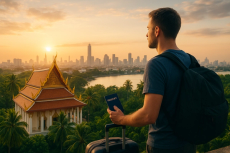


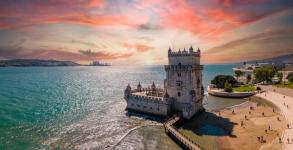
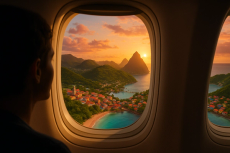
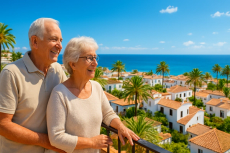
Recently Published


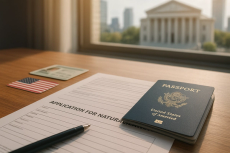

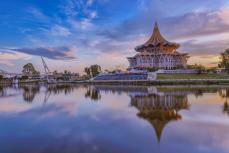




Book a free consultation


